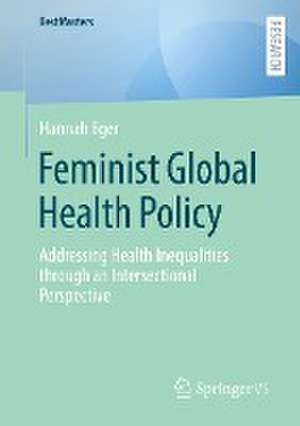Feminist Global Health Policy: Addressing Health Inequalities through an Intersectional Perspective: BestMasters
Autor Hannah Egeren Limba Engleză Paperback – 6 ian 2024
Din seria BestMasters
-
 Preț: 362.32 lei
Preț: 362.32 lei - 13%
 Preț: 367.41 lei
Preț: 367.41 lei -
 Preț: 364.14 lei
Preț: 364.14 lei - 5%
 Preț: 403.96 lei
Preț: 403.96 lei -
 Preț: 377.18 lei
Preț: 377.18 lei -
 Preț: 367.05 lei
Preț: 367.05 lei - 13%
 Preț: 364.57 lei
Preț: 364.57 lei - 13%
 Preț: 366.14 lei
Preț: 366.14 lei - 13%
 Preț: 368.35 lei
Preț: 368.35 lei -
 Preț: 391.41 lei
Preț: 391.41 lei - 13%
 Preț: 367.41 lei
Preț: 367.41 lei -
 Preț: 311.76 lei
Preț: 311.76 lei -
 Preț: 396.86 lei
Preț: 396.86 lei -
 Preț: 406.59 lei
Preț: 406.59 lei -
 Preț: 365.66 lei
Preț: 365.66 lei -
 Preț: 394.31 lei
Preț: 394.31 lei - 13%
 Preț: 365.83 lei
Preț: 365.83 lei - 13%
 Preț: 396.42 lei
Preț: 396.42 lei - 20%
 Preț: 366.22 lei
Preț: 366.22 lei -
 Preț: 364.14 lei
Preț: 364.14 lei -
 Preț: 367.05 lei
Preț: 367.05 lei -
 Preț: 346.23 lei
Preț: 346.23 lei -
 Preț: 365.59 lei
Preț: 365.59 lei -
 Preț: 392.13 lei
Preț: 392.13 lei -
 Preț: 251.34 lei
Preț: 251.34 lei - 20%
 Preț: 292.10 lei
Preț: 292.10 lei -
 Preț: 404.05 lei
Preț: 404.05 lei -
 Preț: 393.58 lei
Preț: 393.58 lei -
 Preț: 393.58 lei
Preț: 393.58 lei -
 Preț: 344.87 lei
Preț: 344.87 lei -
 Preț: 410.77 lei
Preț: 410.77 lei -
 Preț: 411.75 lei
Preț: 411.75 lei -
 Preț: 379.30 lei
Preț: 379.30 lei -
 Preț: 411.32 lei
Preț: 411.32 lei -
 Preț: 412.89 lei
Preț: 412.89 lei -
 Preț: 377.73 lei
Preț: 377.73 lei -
 Preț: 378.12 lei
Preț: 378.12 lei -
 Preț: 412.51 lei
Preț: 412.51 lei -
 Preț: 481.79 lei
Preț: 481.79 lei -
 Preț: 377.18 lei
Preț: 377.18 lei -
 Preț: 480.06 lei
Preț: 480.06 lei -
 Preț: 376.04 lei
Preț: 376.04 lei -
 Preț: 382.95 lei
Preț: 382.95 lei -
 Preț: 377.95 lei
Preț: 377.95 lei -
 Preț: 412.68 lei
Preț: 412.68 lei -
 Preț: 376.80 lei
Preț: 376.80 lei -
 Preț: 380.45 lei
Preț: 380.45 lei -
 Preț: 410.17 lei
Preț: 410.17 lei -
 Preț: 410.94 lei
Preț: 410.94 lei -
 Preț: 380.63 lei
Preț: 380.63 lei
Preț: 462.51 lei
Preț vechi: 544.13 lei
-15% Nou
Puncte Express: 694
Preț estimativ în valută:
88.51€ • 96.11$ • 74.35£
88.51€ • 96.11$ • 74.35£
Carte tipărită la comandă
Livrare economică 23 aprilie-07 mai
Preluare comenzi: 021 569.72.76
Specificații
ISBN-13: 9783658434960
ISBN-10: 3658434961
Pagini: 115
Ilustrații: XV, 115 p. 6 illus., 5 illus. in color.
Dimensiuni: 148 x 210 mm
Greutate: 0.18 kg
Ediția:1st ed. 2023
Editura: Springer Fachmedien Wiesbaden
Colecția Springer VS
Seria BestMasters
Locul publicării:Wiesbaden, Germany
ISBN-10: 3658434961
Pagini: 115
Ilustrații: XV, 115 p. 6 illus., 5 illus. in color.
Dimensiuni: 148 x 210 mm
Greutate: 0.18 kg
Ediția:1st ed. 2023
Editura: Springer Fachmedien Wiesbaden
Colecția Springer VS
Seria BestMasters
Locul publicării:Wiesbaden, Germany
Cuprins
Introduction.- Health inequalities.- Political endeavours and opportunities.- Research interest and research question.- Research methodology.- Framework for a feminist global health policy.- Discussion.- Conclusion.
Notă biografică
About the author
Hannah Eger completed both the MSc Public Health and MA Political Science programmes at Bielefeld University. She has worked with several NGOs in the field of Global Health and she is passionate about applying feminist approaches to health policy. Hannah Eger considers herself an intersectional feminist. She is based in Berlin, Germany.
Textul de pe ultima copertă
Health inequalities, primarily driven by the structural determinants of health, are a major concern towards the global goal of health for all. A feminist global health policy has the potential to address the unequal distribution of power and to dismantle these imbalances. The prioritisation of intersectional, holistic, human rights-based approaches intends to advance health equality and reproductive justice. This research examined the contours and potentials of a feminist global health policy by developing a framework. Online focus groups were conducted with participants affiliated to either the global-academic or local-activist level, envisaging global representation. The elaborated framework provides a nexus between the global and the local level, by entailing universal principles as well as recommendations and sensitivity for context-specific adaptations. Community and policymakers are identified as key actors. This research aims to stimulate a debate on feminist global health policy and the potential of this framework with regard to health equality and reproductive justice.
About the author
Hannah Eger completed both the MSc Public Health and MA Political Science programmes at Bielefeld University. She has worked with several NGOs in the field of Global Health and she is passionate about applying feminist approaches to health policy. Hannah Eger considers herself an intersectional feminist. She is based in Berlin, Germany.
